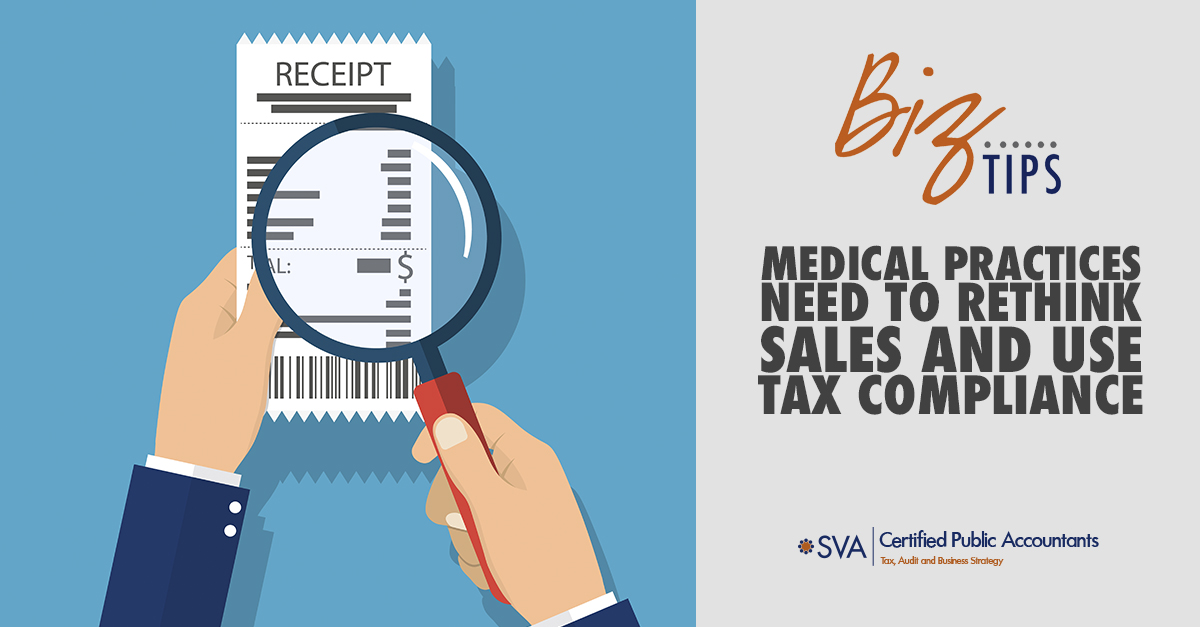Medical practices aren’t usually considered at high risk for a sales and use tax audit. But sales and use tax compliance has become a growing issue in recent years due to the growth of online commerce.
If your practice is subject to an audit by state tax authorities, you will need to be in compliance with all applicable sales and use tax rules.
Forty-five states impose a sales tax on most goods and some services. The seller typically collects the sales tax at the time of the sale and remits it to the state. If the seller doesn’t collect tax on the purchase, corresponding use tax laws require the buyer remit the tax. As a result, sales and use tax compliance relates to any good or service that your practice buys and sells.
Below are factors to consider so that your medical practice isn’t caught off guard by a sales and use tax compliance issue.
How Does Your State Tax Medical Services?
Most states exempt medical services from their sales tax. However, Hawaii taxes gross income of most services, including those provided by medical practices. New Mexico also applies its tax to most services, though services provided through a government-funded medical program are often exempt.
In addition, states constantly revisit what’s taxable and what’s exempt in their sales tax law. You should periodically review your states sales and use tax statute and regulations related to the medical industry to ensure your practice is up-to-date on its compliance.
As part of your tax preparation, categorize your medical practice’s taxable and nontaxable purchases and sales. If sales or use tax is due, record proof of payment. Similarly, keep records of tax exempt transactions.
Do You Shop Online for Your Medical Practice’s Supplies?
Until recently, sellers were only required to collect if they had some type of physical presence – such as an employee or facility – in the state where the sale is made. If the seller didn’t collect tax on the purchase, corresponding use tax laws require the buyer remit the tax.
Use tax compliance is relatively low, and this became a growing issue as more businesses and consumers bought things online. If your practice is audited, it’s now much more likely that the auditor will take a close look at your sales and use tax records.
When your practice makes purchases online and sales tax isn’t collected, check whether the purchase was taxable or exempt. For taxable purchases, check how often your state requires use tax remittance. Late use tax payments could lead to penalties and interest. For exempt purchases, record an explanation of why tax wasn’t collected or remitted.
If your practice makes taxable online purchases where sales taxes haven’t been collected, that could change. This past June, a U.S. Supreme Court ruling in the South Dakota v. Wayfair case ruled that a state can require a seller to collect its sales tax even if the business doesn’t have a physical presence in that state. Many states are now moving to implement new sales tax laws.
Nevertheless, it will take time for states to register new sellers, and smaller sellers may be exempt from these new compliance requirements. So regardless of whether the online seller collects tax or not, your medical practice should remain vigilant about following your state’s applicable sales and use tax rules. States frequently change definitions of what’s taxable and what’s exempt, so your practice needs to constantly monitor the tax implications for its own sales and purchases.
For questions on sales and use tax compliance rules, please contact SVA.

© 2018 CPAContentPlus

